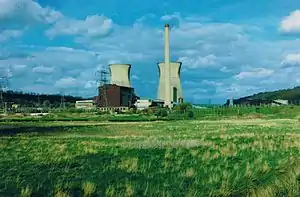Elland Power Station
Elland Power Station was a coal-fired power station situated adjacent to the Manchester to Wakefield railway line and on a loop of the River Calder, north east of the town of Elland in West Yorkshire. The station occupied a site of some 65 acres.
| Elland Power Station | |
|---|---|
 Elland Power Station | |
| Country | England |
| Location | West Yorkshire |
| Coordinates | 53.694312°N 1.822772°W |
| Construction began | 1951 |
| Commission date | 1959 |
| Decommission date | 1991 |
| Operator(s) | Central Electricity Generating Board |
| Thermal power station | |
| Primary fuel | Coal |
| Power generation | |
| Nameplate capacity | 180 MW |
| External links | |
| Commons | Related media on Commons |
grid reference SE118220 | |
History
The construction of Elland Power Station was planned in 1945. It was designed and built by the then Central Electricity Generating Board (CEGB), Northern Project Group. Building work began in 1951 and the project cost £10 million. The first generating unit began generating electricity on 7 August 1959, but the station did not officially open and begin generating at full capacity until 28 April 1961.[1] The station used three Metropolitan Vickers 180 MW generating sets.[2] Later in the 1960s, the station won an award for its clean and efficient operation. There were three boilers (two John Brown, one Yarrow) each rated for 69 kg/s of steam; steam conditions were 62.06 bar and 482 °C.[3] The cooling towers were built by Davenport Engineering.[4]
The generating capacity, electricity output and thermal efficiency were as shown in the table.[5][6]
| Year | Net capability, MW | Electricity supplied, GWh | Load as per cent of capability, % | Thermal efficiency, % |
|---|---|---|---|---|
| 1960/1 | 180 | 1354.533 | 92.1 | 29.56 |
| 1961/2 | 180 | 1361.476 | 92.5 | 29.42 |
| 1962/3 | 180 | 1233.410 | 83.81 | 29.06 |
| 1966/7 | 180 | 1234.99 | 83.9 | 29.19 |
| 1971/2 | 180 | 732.597 | 49.6 | 27.11 |
| 1978/9 | 180 | 695.019 | 47.2 | 27.01 |
| 1981/2 | 180 | 496.220 | 33.7 | 27.34 |
Coal from the Yorkshire coalfields was delivered by train on the adjacent Calder Valley Line and moved around the site using 0-4-0 shunters. Elland No. 1, a CEGB 0-4-0 diesel shunter is preserved at Mangapps Railway Museum, Burnham-on-Crouch, Essex.[7]
On 22 November 1971, the station's conveyor belt was destroyed in a fire.[1] After the UK's electric supply industry was privatised in 1989, the station was operated by PowerGen.[8] The station closed in 1991 before being demolished in 1996. The station's site is now the site of Lowfields Industrial Estate[1] although the associated switching substation was retained and remains in use.
References
- Bull, Malcolm (2008). "Malcolm Bull's Calderdale Companion". Retrieved 11 December 2008.
- "REFERENCE INSTALLATION LIST" (PDF). March 2008. p. 29. Archived from the original (PDF) on 11 September 2011. Retrieved 11 December 2008.
- Handbook of Electricity Supply Statistics 1989. London: The Electricity Council. 1990. p. 6. ISBN 085188122X.
- Garrett, Frederick C., ed. (1959). Garcke's Manual of Electricity Supply vol.56. London: Electrical Press. pp. A-54.
- CEGB Statistical Yearbook, various dates
- CEGB Annual report and Accounts, 1961, 1962 & 1963
- "Mangapps Railway Museum - Stock List". Archived from the original on 1 August 2007. Retrieved 20 August 2009.
- "Table 3.7 - Generation Disconnections since 1991". National Grid. 2003. Archived from the original on 5 December 2012. Retrieved 5 January 2009.
